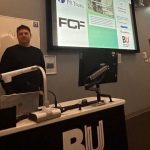 Produced by Guest blogger
Produced by Guest blogger
Choosing my degree
I first chose my degree back in 2006, after 6 years of working in the humanitarian field. Having realised that charity work was my definite career pathway, I decided to invest in my potential. Inevitably, my work is based abroad and therefore gaining a qualification which is recognized internationally was most the most important thing for me.

What I wanted to get from my degree
My first choice was to attend a UK university. My preference was for the course to have a strong emphasis on assignments rather than examinations. Going through the different Master courses online, I landed on the MSc in Public Health at Bournemouth University which seemed to fit my envisaged mode of study. I was out to gain skills that applied practically to my work.
The best things about my course and the overall academic experience
Humanitarian work now favours capacity building and employers around the globe demand that employees not only bring experience but skills and capacities that a Master level of education can deliver. For me particularly, the course gave me confidence. The academic staff were awesome, Jacque and Martin were my favourite’s. The intellectual approach of Professor Ahmed Khattab was very motivating and being in the class of Professor Edwin van Teijlingen was fulfilling. The whole Health Promotion & Partnership Working module is very practical and useful for me even at the time of writing this. Thanks to Dr Anne Mills. Last but not least, Dr Liz Norton remains my contact for Bournemouth University.
My favourite aspects of non-academic life
I enjoyed walking, coming from the tropics where sometimes walking is made uncomfortable by high temperatures, I enjoyed my walks in Bournemouth. Shopping at ASDA and the 99p store were also highlights. With some African restaurants (including Nigerian) to enjoy and the occasional train and bus rides to London, life was never boring. Initially I was apprehensive but it was worth my time and finance. The lectures and lecturers are a permanent memory for me. I take pride in having been a part of the BU history. My one year was very enjoyable.
How I got my current job and what it involves
Before coming to BU my career aspirations were to gain skills and contribute to the humanitarian field not only professionally but academically. I have not published any work yet, but I am on the way to achieve exactly that. As for how I landed my current job, it was actually simple… I was keen for a new challenge. I looked around on major charity and humanitarian websites and after a series of interviews I was offered my current job. My work involves partnerships, dealing with beneficiaries, donors and stakeholders in the humanitarian field.
What I enjoy the most in my job
It’s flexible and knowing that my contribution is based on solid evidence backed by a BU academic degree helps. My methodical support greatly contributes to partners’ ability to make key program and financial decisions which ultimately influence the overall success of the project. Perhaps most importantly for me, is it’s not just a job but also a lifestyle because I feel passionate about this work and it resonates with my values and interests. My routine involves working with different cultures which is both challenging but also very rewarding. Knowing that my ‘small’ contribution makes the world a better place greatly drives me to start new assignments. It is fulfilling.
Skills/knowledge gained from my degree
The skills of critical analysis, evidence based programming and most importantly the ability to understand office powers and networking in a way that can positively contribute to the organisational good. My dissertation project was on Evidence of Barriers to Accessing Maternal Health Services in Sudan, Ethiopia and Eritrea. I am very lucky to have worked in Sudan since my graduation in a project that directly deals with aspects of my thesis. For me, it was not just passing the exam, but getting skills that will enhance my productivity. I am able to exhibit capacity in critical thinking and analysis and demonstrate competency in managing projects by using knowledge to solve problems. Collaborative working in various cultures, dealing with complex, unpredictable issues and making informed decisions and communicating effectively are attributable to skills gained at BU.
Job-hunting advice
Volunteering can give you a chance to gain experience in time management, understanding office politics and skills that increase your employability. How you get along with others is vital in the humanitarian field.
Alfred Shitemi Lisangari –MSc Public Health Alumni









